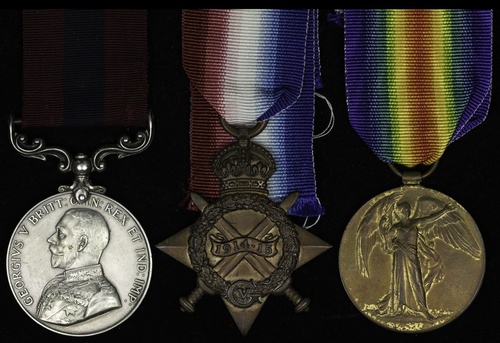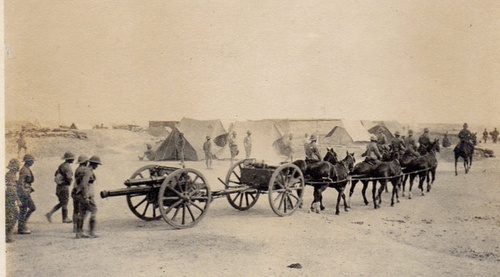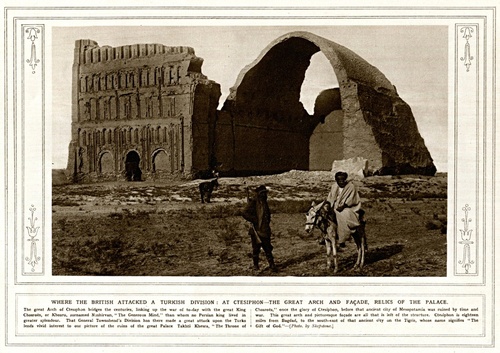Auction: 25111 - Orders, Decorations and Medals - e-Auction
Lot: 690A
'No words can adequately describe the appalling misery of that scene. Here were men who had suffered and fought the long months of the siege, although they were gradually starved and were not fit to do a day's march, yet they were being driven across the pitiless waste under a scorching sun, herded along by a brutal and callous escort of Arab conscripts. Limping and staggering along they all finally arrived, some of them being assisted along by comrades, who themselves were in dire need of assistance'.
A fellow P.O.W. describing the terrible conditions on the march from Kut, taken from The British Army In Mesopotamia, 1914-1918 by Paul Knight
The Battle of Ctesiphon 1915 D.C.M. group of three awarded to Gunner A. Sylvester, Royal Field Artillery, who earned his award and was further 'mentioned' for gallantry, was wounded in action at the Siege of Kut and taken Prisoner of War, he died likely during the horrific march from Kut, the deplorable conditions of which are noted in the excerpt above
Distinguished Conduct Medal, G.V.R. (60922 Gnr: A. Sylvester. 6/A.C. R.F.A.); 1914-15 Star (60922 Gnr: A. Sylvester. R.F.A.); Victory Medal 1914-19 (60922 Gnr. A. Sylvester. R.A.), very fine (3)
D.C.M. London Gazette 12 December 1917.
M.I.D. London Gazette 13 July 1916.
Abner Sylvester was born on 1 August 1892 in Brownhills, Staffordshire, one of six children of Abner Sylvester and his wife Helen. The elder Sylvester was a Lance Corporal in the 21st Royal Scots Fusiliers and had seen service in South Africa. The younger Sylvester lived with his family at Rotherham, Yorkshire where he worked as a miner prior to enlisting with the Royal Field Artillery on 12 January 1910, at the age of eighteen. First serving at home, a few months after the start of the First World War Sylvester was disembarked at the Asiatic Front on 17 November 1914 as part of the Expeditionary Force in Mesopotamia.
The British advance to capture Baghdad came to a standstill with the four-day battle of Ctesiphon in November 1915. Here the British, under Major-General Sir Charles Townshend, were vastly outnumbered by Ottoman forces, suffering a major setback and sustaining heavy losses. Lieutenant Henry Gallup of the Royal Field Artillery provides an account of the unit's experience during the battle:
'After several hours' fighting the enemy's chief position was carried and occupied by our troops, and we then turned our attention to their left flank, where our people were not getting on well at all, and were in fact retiring. It was about 3 o'clock in the afternoon that the Turks counter-attacked so strongly. We found afterwards that they had been re-inforced with about 5,000 fresh troops. The 82nd Battery and ourselves were sent forward to try and stop it. I think we managed to do so, for a time anyhow, but it was a very warm time. They then attacked from another quarter and drove our infantry in and we had to limber up and get out as quickly as we could under a most beastly hot fire'.
It was in this action that Sylvester earned his D.C.M. 'for gallant conduct and devotion to duty' on 22 November 1915, though the citation did not appear in the London Gazette until two years later in December 1917. The specific citations were unfortunately all lost the following month at the Siege of Kut, but Sylvester's family reportedly believed that the award was earned for swimming across the Tigris River with a life line.
His men exhausted and resources depleted following Ctesiphon, Townshend decided to fall back to the base at Kut-al-Amara and await relief. However, leader of the Ottoman forces Lieutenant-General Nureddin Pasha pursued the British to Kut upon learning of their retreat. Pasha's Army besieged the garrison for months, with the British supplies dwindling from February. No. 30 Squadron of the Royal Flying Corps launched the first air supply in history to drop much needed food and ammunition but, even so, disease was rampant and the starving Allied forces ate horse meat to survive.
During the Siege, Sylvester reportedly suffered a serious gunshot wound whilst in action on 24 December 1915. Whilst there are no details of his wound, and Sylvester was nonetheless soon back in the field of action as he was Mentioned in Despatches on 17 January for gallant conduct. Records also note that he was dangerously wounded on 24 February, though this may be in reference to his gunshot wound from December and rather reflects the date on which the War Office was notified.
Townshend was finally forced to surrender to the Ottomans on 29 April 1916, with the disastrous Siege of Kut being recognised as one of the worst defeats suffered by the Allied forces in the First World War. Sylvester, along with the remainder of the garrison - some 13,000 Allied soldiers - were taken prisoner of war. What followed was a gruelling forced 'death march' to Turkish prison camps, with the prisoners being badly mistreated and whipped by Ottoman troops along the route. The Birmingham Daily Mail described the arduous journey:
'A correspondent of the "Times" gives particulars of the suffering of private soldiers, British and Indian, who surrendered at Kut last spring. He says they have been driven from Lower Mesopotamia to Anatolia (Western Asia Minor), a distance of nearly 1,000 miles, in straggling detachments. A large batch of them arrived at Konia late in 1916 in a terrible plight. Hunger and destitution have taught the men to what a low level life may sink in Turkey. Their guards have been cruel, and they have suffered countless humiliations.'
This, coupled with the eyewitness description from another P.O.W. provided in the title, give some indication of the appalling conditions British and Indian soldiers were forced to endure. Sylvester was ultimately reported as having died between 29 April 1916 and 31 December 1916, and the family believed his death to have occurred during the march. This is entirely likely, especially given that Sylvester had already been wounded during at Kut. A third of the 13,000 Allied forces taken prisoner ahead of the march did not live to see liberation.
The young Sylvester must have been much missed; upon hearing that his son was taken prisoner of war, his father had sent numerous letters to the authorities to ascertain his whereabouts. The younger Abner Sylvester's medals and effects were sent to his father at 65 Kelvin Street, Dalton Brook, Rotherham, Yorkshire after his death.
Sylvester is commemorated on the Basra Memorial in Iraq, and his name engraved on the memorial to the fallen in St Peter's Church in Thrybergh, Rotherham. He is further entitled to M.I.D. oak leaves; sold together with a wealth of copied research.
Subject to 20% VAT on Buyer’s Premium. For more information please view Terms and Conditions for Buyers.
Sold for
£900











